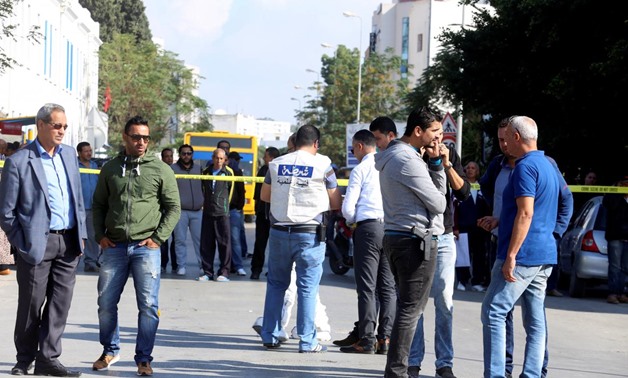
Police officers are seen where suspected Islamist militant was arrested after wounding two policemen in a knife attack near the parliament building in Tunis, Tunisia November 1, 2017. REUTERS/Zoubeir Souissi
TUNIS - 9 January 2018: Tunisia's main opposition party on Tuesday called for protests against the "unjust" 2018 budget including price and tax hikes to continue until the government scraps it, a day after one demonstrator was killed in clashes.
Protests erupted in more than 10 towns across Tunisia on Monday against the price and tax increases imposed by the government to reduce its ballooning deficit and satisfy its international lenders. One protestor was killed in Tebourba, a town 40 km (25 miles) west of the capital Tunis.
While Tunisia is widely seen as the only democratic success story among the "Arab Spring" nations where revolts took place in 2011, it has had nine governments since then and none of them have been able to tackle the country's growing economic problems.
Late last year, the current government agreed to a four-year loan programme with the International Monetary Fund worth about $2.8 billion in return for economic reforms.
Public anger has been building since Jan. 1, when the government raised the prices of petrol and other items and hiked taxes on cars, phone calls, internet usage and hotel accommodation as part of those economic reforms.
"Today we have a meeting with the opposition parties to coordinate our movements, but we will stay on the street and we will increase the pace of the protests until the unjust financial law is dropped," Popular Front leader Hamma Hammami told reporters.
He said the government was unfairly targeting the poor and middle classes with its austerity measures.
Prime Minister Youssef Chahed called for calm, saying the economy would improve this year. Chahed heads a coalition of Islamist and secular parties but has been under constant pressure from powerful labour unions.
He told reporters that while demonstrations were acceptable, violence was not.
"People have to understand that the situation is extraordinary and their country is having difficulties, but we believe that 2018 will be the last difficult year for the Tunisians," Chahed said.
The 2011 uprising and two major militant attacks in Tunisia in 2015 damaged foreign investment and tourism, which accounts for 8 percent of its economic activity.
The trade deficit expanded by a quarter in the first 11 months of 2017 to a record $5.8 billion, data showed in December, and the dinar currency weakened to more than three per euro for the first time ever on Monday.
Europe is concerned about stability in Tunisia, partly because unemployment there has forced many young Tunisians to go abroad, while the number of boats smuggling migrants to Italy has risen and Tunisia has also produced the largest number of jihadists heading for battlefields in Iraq, Syria and Libya.
'SACRIFICING THE POOR'
Khelifa Chibani, a spokesman for the interior ministry, said 44 people had been arrested for carrying weapons such as knives, setting government buildings on fire and looting shops.
"What happened had nothing to do with democracy and protests against price hikes... Yesterday protesters burned down two police stations, they looted shops, banks and damaged property in many cities," he said.
The demonstrations have so far been much smaller in scale than previous protests since the overthrow of autocrat ruler Zine El-Abidine Ben Ali in 2011.
But those confrontations between the government, labour unions, Islamists and secular forces also started on a small scale before escalating.
Analysts say Chahed could amend some of his reform proposals to calm social tensions. Under pressure from unions, officials have already agreed to increase public sector salaries this year and to avoid compulsory lay-offs which could provoke protests.
The government says it wants to cut the public sector wage bill to 12.5 percent of gross domestic product in 2020 from about 15 percent now by offering voluntary redundancies.
But it is also trying to impose higher petrol prices and contributions to social security, which are tough for many people to swallow after years of hardship.
"At the time of Ben Ali, which we did not like, I filled my stand with vegetables, fruits and other items with 10 dinars, and now 50 dinars do not fill this gap. The situation has worsened dramatically," said Fatma, a market woman in a Tunis district where protests took place on Monday.
"The government is sacrificing the poor and the middle class by raising prices and ignoring tax evaders and businessmen," she said.


Comments
Leave a Comment